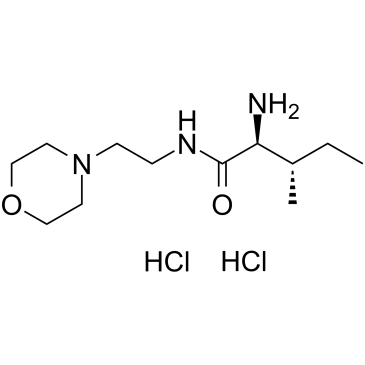1243259-19-9
| Name | (2S,3S)-2-Amino-3-methyl-N-[2-(4-morpholinyl)ethyl]pentanamide Hydrochloride |
|---|---|
| Synonyms | (2S,3S)-2-amino-3-methyl-N-(2-morpholin-4-ylethyl)pentanamide |
| Description | LM11A-31 dihydrochloride, a p75NTR (neurotrophin receptor p75) Ligand, is a potent proNGF (nerve growth factor) antagonist. LM11A-31 dihydrochloride is a water-soluble, non-peptide with high blood-brain barrier permeability[1][2]. |
|---|---|
| Related Catalog | |
| Target |
proNGF[1] |
| In Vivo | LM11A-31 (oral gavage; 50 mg kg/day for 4 weeks) significantly mitigates proNGF accumulation and preserves BRB integrity[1]. LM11A-31 (orally; 50 or 75 mg/kg) administered for 3 months starting at 6-8 months of age prevents and/or reverses atrophy of basal forebrain cholinergic neurites and cortical dystrophic neurites in mid-stage male APPL/S mice[2]. Animal Model: Male C57BL/6 J mice[1] Dosage: 50 mg kg/day Administration: Oral gavage; for 4 weeks Result: Mitigated proNGF accumulation and preserved BRB integrity. |
| References |
| Molecular Formula | C12H27Cl2N3O2 |
|---|---|
| Molecular Weight | 243.34600 |
| Exact Mass | 243.19500 |
| PSA | 71.08000 |
| LogP | 1.28670 |
